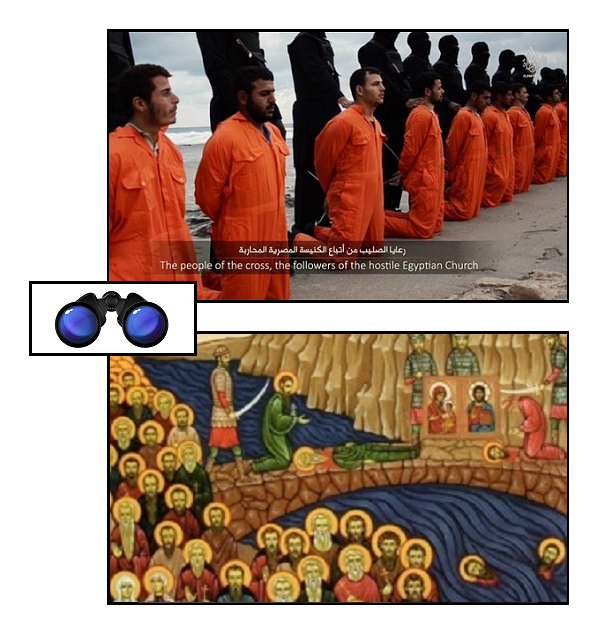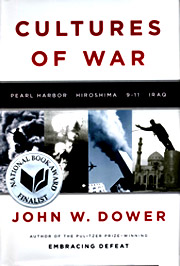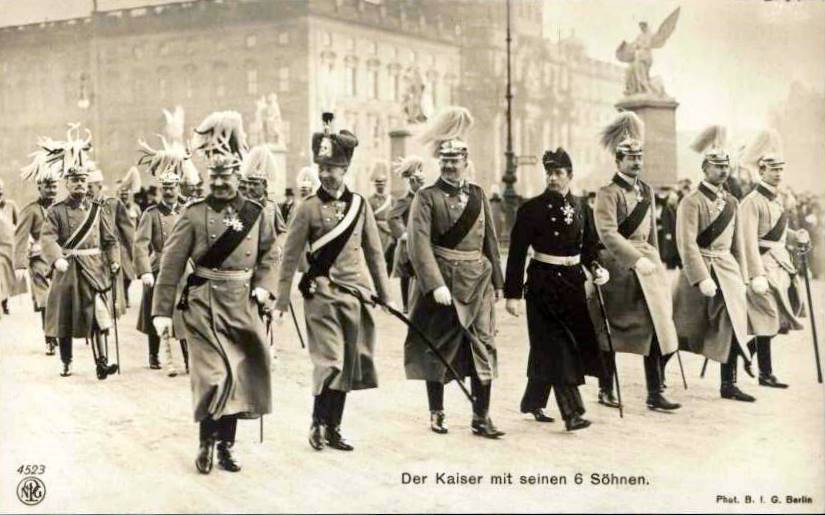Rofer on The Fall of Beria and Putin’s Vanishing Act
Thursday, March 19th, 2015[by Mark Safranski, a.k.a. “zen“]

Lavrenty Beria (center)
Russian President and brazen strongman Vladimir Putin reappeared Monday, looking wan and a little uncomfortable for the cameras, but jesting at the mad swirl of internet rumors sparked by his extended absence from public view. One of the rumors, which may have been true, was that Putin was engaged in a power struggle with his own siloviki inner circle unhappy with Western sanctions placed on Russia. Many commentators could not help but recall similar incidents from the Soviet past and friend of ZP, Cheryl Rofer had an excellent post featuring one of the most sinister figures in Russian history, Stalin’s fearsome secret police chief, NKVD boss, Lavrenty Beria:
A Soviet Coup – The Fall of Lavrenty Beria
….As Putin moves toward more authoritarian rule, we can expect to hear rumors whenever he goes out of sight for more than a couple of days. Both wishful thinking and the real possibility that some in his government are unhappy with his actions will continue to mix in the question of a coup. And anyone over 60 years of age is a candidate for sudden death or stroke.
Boris Nemtsov’s death, among other things, may have caused concern among various members of Russia’s elite that they are vulnerable or may have set off a fight between the FSB and Chechen politicians and security services. Nemtsov was one of Boris Yeltsin’s potential successors, along with Putin in the late 1990s. Putin has not been kind to his political rivals, but Nemtsov is the first to be murdered. And it is not clear who murdered him; the FSB and Chechen authorities are seriously arguing about this. Fear of being killed, however, is a powerful motivator toward a coup.
The situation more and more resembles the undertainties of the Soviet Union as Putin consolidates power. Succession in the Soviet Union was a vexed question, but is nominally by popular election in post-Soviet Russia, not yet fully normalized. Putin has played fast and loose with elections, first as Yeltsin’s handpicked successor and later with his tradeoff with Dmitry Medvedev as Prime Minister and President.
If Putin were seriously ill or dead, or if a coup seized power, we would not hear about it immediately. Nobody in the Russian government takes stability for granted – instability is one of Putin’s great fears – so those in power would want to project continuity, that nothing is wrong, until the change can be introduced smoothly.
In today’s world of social media and a somewhat more open Russia, suppressing that kind of news will be more difficult to do than after Stalin’s stroke, but, given all that we do not know about the Kremlin’s current activities, suppressing that information for at least a week or two seems entirely possible.
Stalin succeeded Lenin, with some question as to Lenin’s intentions, in the 1920s. He then set about consolidating his power and eliminating rivals. Stalin died of a stroke in March 1953. What happened next got complicated. This description is condensed from Mark Kramer’s “Leadership Succession and Political Violence in the USSR Following Stalin’s Death,”Chapter 4 in Political Violence: Belief, Behavior and Legitimation, Paul Hollander, ed., New York: Palgrave Macmillan, 2008.
As is the case in Putin’s Russia, no single person was obviously Stalin’s successor. A group of high-ranking men took over immediately after his death in what they called “collective leadership,” within which an extreme power struggle took place. Lavrenty Beria was one of those men. He had been Stalin’s hit man and thus perceived by the others as the most dangerous. His removal suggests how a coup might take place against Putin.
Cheryl nails a key problem of stability in Putin’s post-Soviet Russia.
Like the USSR, there is no accepted de jure process for removing an incapable or dangerous ruler other than natural causes. unlike the old Soviet Union, Putin’s Russia is a hollowed out state. The USSR had a Politburo, Presidium and a Central Committee – an intact senior leadership cadre on standby in case a General-secretary were to die. The succession structure around Putin is sketchy at best and thus while the regime is outwardly strong, in reality this vulnerability renders it dangerously fragile – too much so for the Earth’s other nuclear superpower state.
….Stalin suffered a stroke on March 2 and died on March 5. His death was publicly announced on March 7. Even before the stroke, potential successors began maneuvering. By March 3, they agreed on the immediate post-Stalin government: Georgii Malenkov would be head of government, with Vyacheslav Molotov as foreign minister, and Beria in charge of state security. Ten of Stalin’s favorites were added to the Communist Party Presidium, including Nikita Khrushchev. Malenkov, Beria, and Khrushchev were designated to oversee Stalin’s documents and personal papers. All this was approved by the Communist Party’s high officials.
The men had had close calls with Stalin’s purges and understood well that their positions were precarious, surrounded by rivals. The CPSU presidium rapidly adopted reforms after Stalin’s death that would make such purges less likely in the future. Malenkov delivered a speech to the Presidium in April 1953 denouncing the cult of personality without criticizing Stalin directly. Beria moved to reform the police and gulag system. Forced Russification in Ukraine, Belarus, and the Baltic states would cease. As often happens when rigid governments relax, however, social unrest increased.
Khrushchev early on, with Beria’s help, managed to oust Malenkov from the Presidium, arguing that Malenkov’s other positions were incompatible. By June, however, he had allied with Malenkov to remove Beria. They added the support of other Presidium members. They did not tell all their colleagues, however, that they planned not only to remove Beria, but also to arrest him. Beria was the most distrusted of the group, and the others were willing to see him demoted, although not all were likely to agree with his arrest. His access to Stalin’s files and his previous position meant that he had compromising information about them that could be used to bring them down. Beria was very active in other areas immediately after Stalin’s death, raising suspicions that he aspired to the top position. He replaced the top people in the MVD, the central security organization of the time, with people loyal to him.
The events of 1952-19533 are among the most murky and controversial in Soviet history and may never be fully known.
Stalin, who may have been already suffering from vascular dementia (thus aggravating his already paranoid suspicion) before his fatal stroke, was as most historians agree, preparing a new purge. The scale of this purge is still under debate, but Stalin had already been promoting an anti-semitic campaign against “rootless cosmopolitans” since circa 1948, when he had Molotov’s wife (who was Jewish) arrested for “treason”. Stalin cunningly separated Beria from his day-to-day control over the security services and for good measure, also arrested Beria’s longtime rival, Abukumov, replacing him with more pliant figures. Stalin began distancing himself from his henchmen (“the Oligarchs” in Adam Ulam’s phrase) longtime cronies like Voroshilov and Poskrebyshev were sent into a disgraced semi-retirement. Formal meetings of the politburo became rare events while the presidium was enlarged with new faces while Stalin cooked up “the Leningrad affair” to end the careers and lives of some of the Party’s rising stars and “the Mingrelian Affair” to put pressure on “the Big Mingrel” himself, Lavrenty Beria.
When the “Doctor’s Plot“ of Kremlin doctor assassins was abruptly “uncovered” by Stalin’s pathetic puppet Ryumin, it would have been very hard for senior nomenklatura to avoid seeing the terrible danger that they all found themselves. Most of the unfortunate doctors who aere arrested by the MGB and lavishly tortured had conspicuously Jewish names. They were accused of planning to kill Comrade Stalin and having killed Zhadanov and this was all too reminiscent of the Kirov case that launched the Great Terror.
Some scholars, like Arkady Vaksberg and Edvard Radzinsky think Stalin, who had grown more intensely anti-semitic in his old age, had intended a grand pogrom of Soviet Jewry, finishing off what Hitler had begun. Walter Lefeber saw Stalin’s machinations as contest of wills between Stalin and Malenkov over the danger of a Cold War “capitalist encirclement” and the need to prepare in a hurry for WWIII with America. Most historians, regardless of ideological stripe, agree something quite terrible was in the offing.
Then, after ominously threatening all of his inner circle at a late night drinking session at his dacha, the dictator had a massive stroke during the night and within two days, Stalin died. Perhaps with some help from Beria.
…..A sudden rebellion in East Germany was crushed by Soviet troops on June 17, 1953, causing the plot against Beria to be put on hold temporarily. Because Beria controlled all the internal security forces, the plotters had to use the military to arrest him. General Kirill Moskalenko, the commander of the Moscow Air Defense Region, was willing to cooperate. A total of ten military men were enlisted into the plot.
A meeting of the Presidium was scheduled for June 26. The military men were to remain concealed in the cars behind darkened windows and then enter the building through a side door left open by aides to Malenkov and Khrushchev after Malenkov transmitted an electronic signal to his chief aide who would be stationed outside the chamber where the Presidium was meeting.
Beria, as usual, arrived just before the meeting was to start. Malenkov changed the agenda to focus specifically on Beria’s activities. This was a complete surprise to Beria. Malenkov laid out Beria’s “misdeeds” and alleged that Beria had been seeking to displace the collective leadership and to foment discord among Presidium members. He then proposed a number of possible remedies, all of which included removing Beria from the posts he held. He invited the other members of the Presidium to join in enumerating Beria’s “mistakes,” which they did. This put them on record as supporting Beria’s removal.
As Malenkov summed up the accusations, he pressed the button to alert the military, who marched into the room. He then declared that Beria “is so cunning and so dangerous that only the devil knows what he might do now. I therefore propose that we arrest him immediately.” Moskalenko brought out their guns and arrested and searched Beria.
The first public indication that something had happened to Beria was on June 28, when his name was omitted from a list of Presidium members who had attended the Bolshoi Ballet the previous evening. His arrest was announced on July 10. After a closed trial on December 10, Beria was executed on December 23.
It is important to recall the degree to which Lavrenty Beria was dreaded and loathed by Stalin’s other associates. These were hard men, fanatical Communists, soaked in the blood of innocents up to their elbows; but the blood on Beria went right up to his chin.
Unlike the previous Soviet secret police chiefs under Stalin’s control such as the ailing Menzhinsky, the sycophantic poisoner Yagoda or the insanely murderous dwarf Yezhov, who all served short periods of time before being discarded or dying, Beria was far more than a torturer, spy or policeman to Stalin. An energetic, intelligent administrative wizard with his own power base in Transcaucasia where he reigned supreme, Beria, who Stalin called “his Himmler”, was the Oppenheimer and Groves of the Soviet atomic bomb and (like Kaganovich) Stalin’s all purpose trouble-shooter. This was the key to Beria’s long tenure. While he did not relish personally administering torture as Abakumov did, Beria did not shrink from beating recalcitrant prisoners senseless in his luxurious office. In his hours of rest and amusement, Beria was a habitual rapist and pedophile (his own wife was originally one of his victims) and an enthusiastic practitioner of vendettas. It may be surmised from Beria’s dogged retention of high positions that even Stalin himself was cautious in how he moved against his fellow Georgian protege. As senior Soviet historian General Dmitri Volkogonov wrote “All of the other members of the Politburo, including Malenkov, were afraid of this monster”.
Cheryl concludes:
This is how a coup against Putin might go: the plot is set up in extreme secrecy. Kramer notes that the ability to keep the 1953 plot secret among so many actors was remarkable. Everyone recognized the high stakes and secrecy was normal. Those circumstances would not be too different today. The confrontation would be different, but likely in a meeting that allowed the plotters to outnumber Putin. Today’s Russia no longer requires the cumbersome Soviet methods of accusation and appearance of legality.
There isn’t enough information available to speculate who might lead a coup. It could come from a more moderate faction who believe that Putin is damaging Russia with his war against Ukraine, or from a more nationalist faction who want stronger action against Ukraine and other targets. Or there may be other, less obvious motivations.
To strike the King, it must be a killing blow. Khrushchev knew that it would not be only his head on the block if he failed – Beria would torture his whole family to death or exile his children to the Kolyma or the Arctic circle to die slowly.
The Siloviki around Putin would have to roll the same iron dice.









